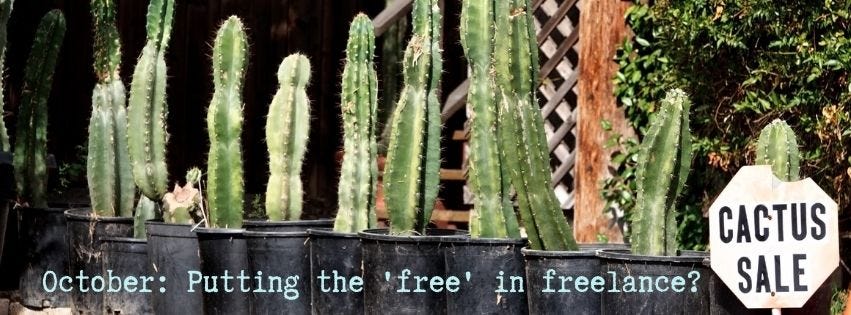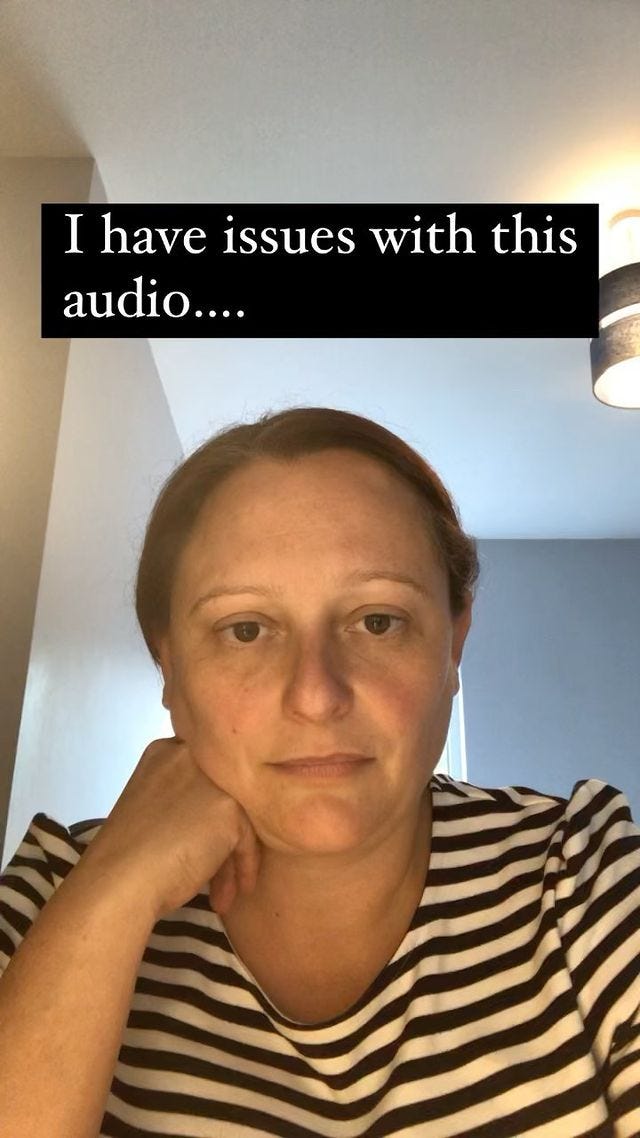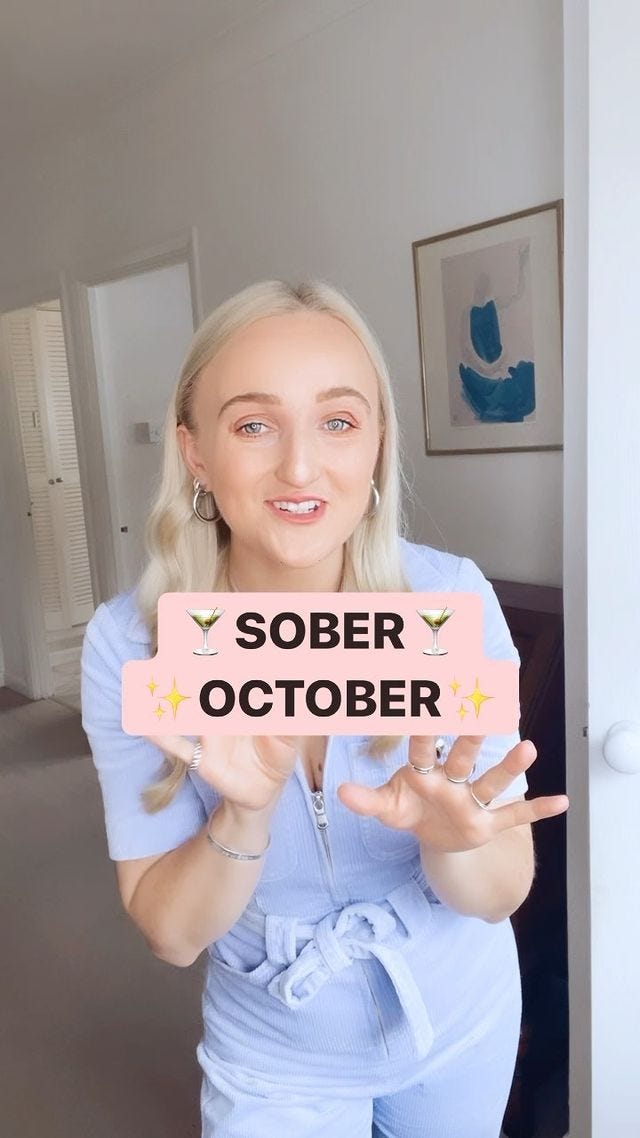I often sit on a comfortable part of the fence when it comes to having a strong opinion as a freelancer. Or, if I do have one that’s more ‘out there’ I tend to talk to others about it rather than writing it down.
But this month I’m going to jump off the fence and go for it… because there’s been something on my mind for a while now and I need to get it out there. I’m nervous, but here goes. I think exposure can help pay the bills.
So, there’s an audio doing the rounds, I found it on Instagram, and it’s about charging for your work. The lyrics include ‘it costs that much cos it takes me &%*$^ hours..’ and ‘exposure doesn’t pay the bills’.
While I understand the sentiment, I feel at odds with this little ditty. Can exposure really not pay the bills? My first reaction is, aren’t the people who are mouthing along to this song courting exposure by using - in their own unpaid time - Instagram?
As a journalist, I have often asked experts to speak to me for features, and we rarely, if ever, offer a fee. Case studies - the people who appear in features, rather than commenting in them or offering advice - often get a fee, for their time and sharing their story. Sometimes it’s a donation to a charity of their choice.
The way we ‘pay’ an expert is by mentioning their website, book or social media, or a project they’re supporting. It’s the same with celebrities. So, while they’re being paid by someone - a publisher, a brand, a film company - they’re not paid by the magazine or journalist. They do it to us, as a favour, for, yes you guessed it, exposure.
It’s a similar deal with podcast guests - and when I guest, too. We all do it for no fee, happy to chat because we get mentions and shout outs.
For me, exposure is a key way I’m building my business, contacts and client base - and with that, pay the bills.
I understand the difference here between working for free and getting your brand ‘out there’. Writing articles for organisations who won’t pay, but have lots of revenue - big magazines and publishers, for example. Speaking at large events which are ticketed, and therefore should be paying their speakers from some of that revenue.
But what about the in-between places? The Facebook live, or the Instagram Live, the aforementioned podcast guesting?
Exposure doesn’t pay the bills directly, but I’d argue that it does indirectly.
And some of the platforms I’ve guest blogged for then share my work with their huge following - is that them working for me for free? Me using the platform they spend time and money running to promote my work?
I wanted to get some perspective on this, so I asked some freelance friends. Is there a difference between collaboration and being used? Between writing for free and guest blogging? What about being interviewed? Is that OK because it’s your time they’re taking, not your active or practical skills?
Hazel Davis, writer and co-founder of MuseFlash (check her and Heidi out on the podcast) says: “The difference is that on your own instagram you own the content and the ONLY person who benefits is you, but writing for free for someone else who’s selling a site or publication isn’t fair. That said, I’ve been very open about the fact that when I started out I wrote for free for AGES for a regional guide (in exchange for tickets and ‘exposure’) and it genuinely did give me a load of cuttings and ‘ins’. But I'm not sure I'd recommend it as an approach!"
This makes me think about where the cut off should be when it comes to exposure or doing something in return for a payment other than cold hard cash. As a writer with over 20 years of bylined articles, I very much set the rates I now charge and am becoming more confident about saying no to bad day rates.
As a coach who is just one year into her work, I know my rates are comparable to that, and I seek out opportunities such as commenting in the press, guest blogging and so on.
As always, this isn’t just about writing and the journalism industry. In coaching, I’ve seen a lot more of the collaboration side of things, people being less protective of their time, seeing things like an Instagram or Facebook live as a direct way to say who they are and what they do to a different audience. Essentially, seeing exposure as essential!
I’ve spoken on lives with the Audrey community, Self Employed Club, and IPSE, and I see these as a collaboration, not working for free. Ditto entering awards which takes a lot of time and the reward is often - yes, you guessed it, a nice logo and exposure!
Audrey have tagged me in their newsletter recently, and I’ve had founder Marina Gask on the Freelance feels podcast. Is this all ‘exposure that doesn’t pay the bills’? I don’t think so! There’s a wider range to the exposure, too. You collaborate with someone, give some of your time, and the next thing they will likely do is tell some of their freelance friends about you. Writing guest blog for person (a) could quite easily lead to a commission from person (b).
And, I’d argue, in the process, you are learning, too. Either perhaps how to use new software (taking part in an online festival allowed me to see Streamyard for the first time), or being a podcast guest can show you how an interview takes place and inspire your own.
Shona Chambers runs the Self Employed Club, and has been a guest on the Freelance Feels podcast. She told me: "Marketing experts seem to agree that people need to hear about us 7 times before they take our business seriously.” (Read more on that in Social Media Today).
“Are people aware when we are being paid for one of these occasions? Probably not. So why not use unpaid exposure as a way to build your brand. Since writing a book last year I have found that speaking in Facebook groups on related topics, going live with others on Instagram, and talking to people on podcasts have all helped my business, my book, and me to be noticed in a good way.”
“Using the hashtag #journorequest to check what people are looking for has also been great for me. I managed to get a free slot on a radio ad that played on 3 stations for 2 weeks, and advertised my business. We can't do everything for free, but unpaid exposure can be a good thing in my opinion."
There is, I think, a difference between sharing your time and sharing your skills - but it’s a wavy, fine line. Because isn’t talking about what you know sharing your skills? Every second of the hour you spend in that interview, or writing some quotes for an article someone is publishing, are you essentially giving them your skills for free? Or are you saying ‘hmm, if I do this now, I can say ‘As seen in’, or if I take part in this, will they tell their super-interesting contacts how great I am?”
For example, a friend who asked not to be named told me: “The reason a publisher got in touch with me about writing a book is because they heard me on a podcast (which I wasn’t paid for).”
And Sophie Cross, founder of Freelancer Magazine, who is on the latest episode of the Freelance Feels podcast, shared her thoughts, too. "It's about thinking carefully about the opportunities that are presented to you - whether you think it's worth your time and you want to do it. Good, targeted exposure can help pay the bills down the line. Interviews and speaking gigs can position you as an expert, be good practice for self-development and provide links back to your website. You aren't obliged to do anything though. Be upfront and value your time."
Managing the exposure…
So if you’re happy to try and walk the fine line between ‘PAY ME’ and ‘Hmmm, this could be a good collaboration’, what can you do?
Confirming the reach of the ‘exposure’
Making it work HARD for you is key, for sure. If you are going to go for it and say ‘fine, exposure here for me seems valid’ then you need to both publicise what you’ve done and make sure the person who is being gifted your time shouts about you, too!
Make sure they agree to post about it on social media - can they confirm they’ll include a note about it in their newsletter, or on their website? Will they guarantee a clear credit for your company and a hyperlink? All these things are part of the reach of your business and those are the ways the exposure starts to being to help pay the bills. Check what their following is before you agree to go ahead.
Make sure they know your worth
Matthew Knight, who runs the Leapers community for freelancers, shared some great advice: “I'm pretty militant on this - if someone expects you or wants you to work for free, then say no. Your time, expertise and work has value and you deserve to have that value recognised,” he says.
“However, if you choose to offer your time at a pro-bono, low-bono or heavily discounted rate - perhaps they're a non-profit, or you really want to work on the project - then of course, that's very kind of you, but it should be your decision not theirs. Make sure you invoice them your full day-rate with a discount or credit applied, so they understand the true cost of the work, and the next time they come asking, you haven't trapped yourself at a super low day-rate.”
Make it fun!
And there’s another element - the enjoyment. Many things I’ve done for exposure are also because I wanted to do them as they sounded fun. Chatting to other freelancers on social media, or being a podcast guest, writing for someone who is also at the start of their freelance journey and being part of their beginnings.
I am NOT saying you should work for free. I’m not saying an event which is ticketed should expect you to speak for free. I’m not saying you should offer yourself for rates below what you’re worth.
But never collaborating? Never saying ‘yes’ to something which isn’t a direct money-spinner? I think you can end up doing yourself, and your business, a disservice.
Read, listen, subscribe…
Read: The Business Survival Kit is new from Bianca Miller-Cole and her husband Byron - we’ve just recorded together for the podcast, too (episode coming this Friday). Bianca was runner up on the Apprentice 2014, and it was ace to talk to her as I’m a huge fan of the show.
Listen: One Last Thought: Bedtime stories for grown ups is by Ed Goodman from Freelance Heroes - “Weekly(ish) short readings” from some of his favourite business and non-fiction books.
Subscribe: A lovely round up of freelance newsletters, including this one (awww) but some other brilliant reads worth your sign up from Journo Resources.
And finally - it’s Sober October, so I urge you all to follow the lovely Millie Gooch who has so much advice on living a sober life. She spoke to me for the podcast and her instagram is FULL of practical tips, fun advice, and support.






